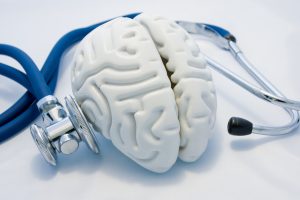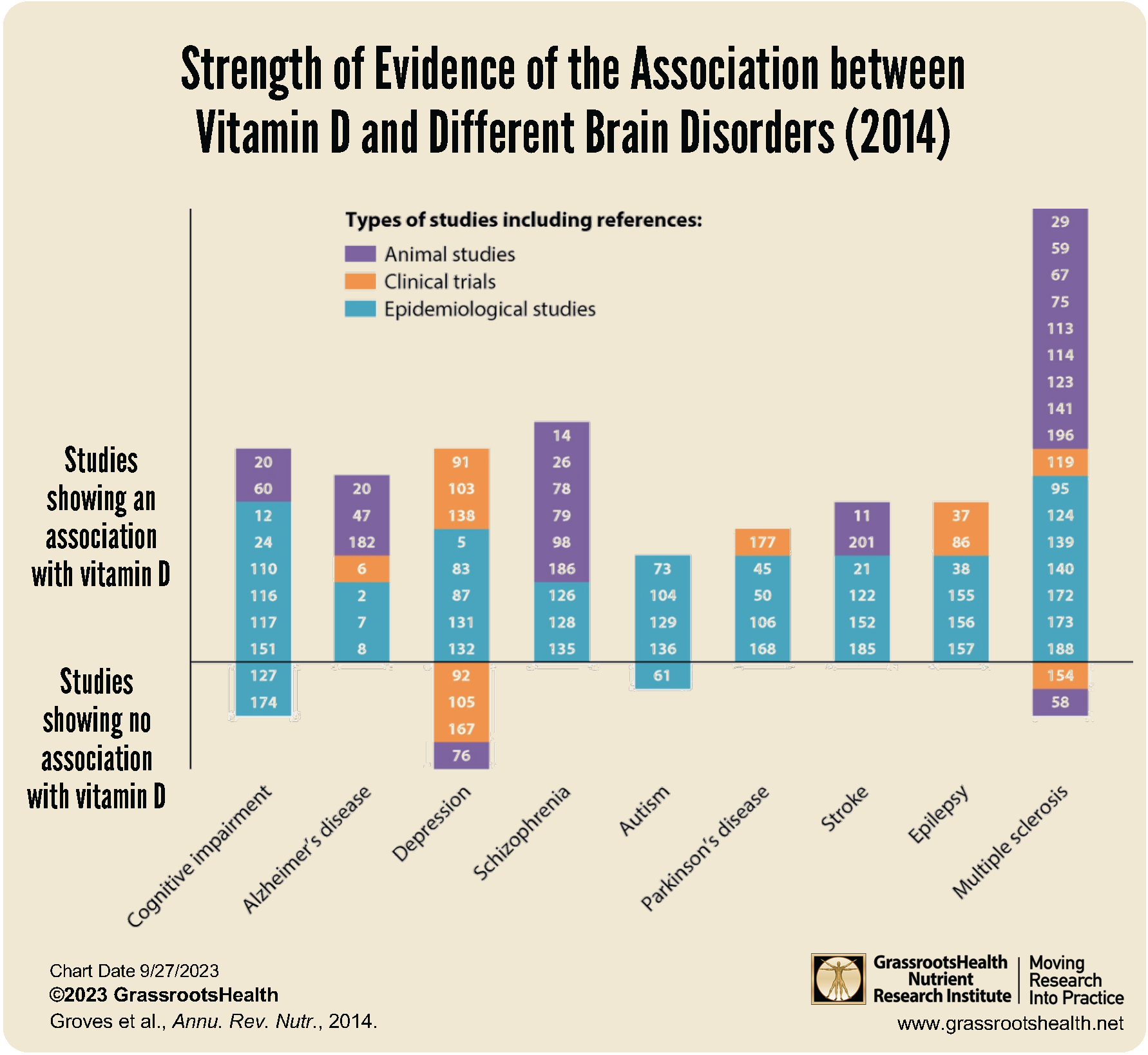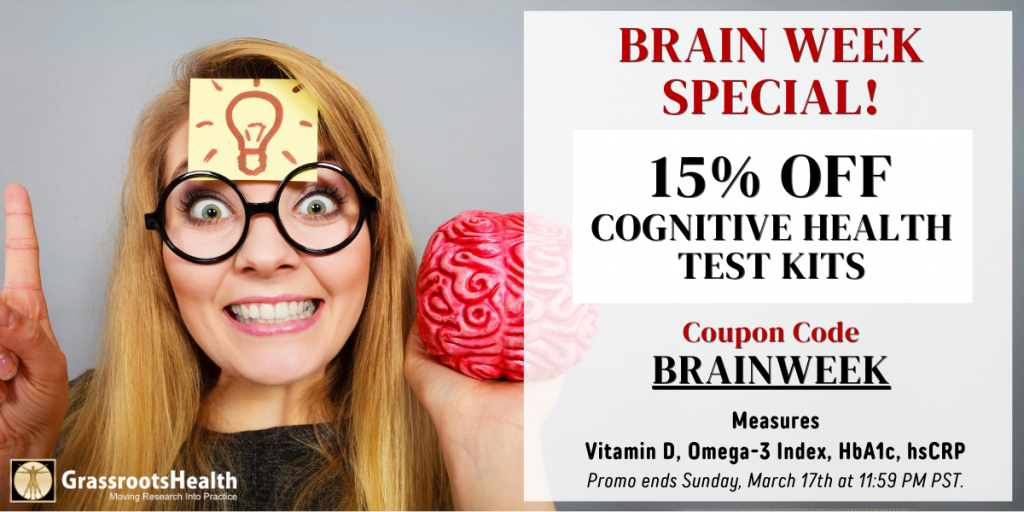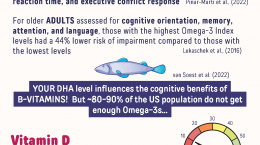Published on March 11, 2024
15% Off Sale Starts Today – Brain disorders now account for more than 15% of all health loss worldwide. Have you taken these simple steps to help protect your brain health?
Key Points
- Vitamin D functions in the brain and nervous system to stimulate neural cell growth and maturation during brain development, protect neural cells from damage due to oxidative stress and inflammation, and it plays a role in the production of neurotransmitters
- A study that originally set out to determine the effectiveness of vitamin B12 and folic acid on cognitive decline discovered a significant correlation with B vitamin supplementation only after considering the amount of omega-3 fatty acids in the blood; individuals with higher plasma DHA levels benefitted more from vitamin B12 and folic acid use compared to those with lower DHA levels
- Thinking, attention, learning, and memory are all closely linked to blood sugar levels and how efficiently the brain uses glucose; in fact, some experts are now calling Alzheimer’s disease “Type 3 Diabetes” due to how insulin resistance and the dysregulation of insulin can contribute to neurodegeneration and the development of the disease
How are Your Levels of Vitamin D and Other Nutrients? Check Now!
 A 2023 Neurology Reviews article on MDedge titled “Global burden of brain disorders surpasses cardiovascular disease and cancer” highlighted findings from the latest analysis of data from the Global Burden of Disease (GBD) study. They found that brain disorders, which include mental illness, neurologic conditions, and stroke, now account for more than 15% of all health loss worldwide – a number that now surpasses that from either cardiovascular disease or cancer.
A 2023 Neurology Reviews article on MDedge titled “Global burden of brain disorders surpasses cardiovascular disease and cancer” highlighted findings from the latest analysis of data from the Global Burden of Disease (GBD) study. They found that brain disorders, which include mental illness, neurologic conditions, and stroke, now account for more than 15% of all health loss worldwide – a number that now surpasses that from either cardiovascular disease or cancer.
According to the data, which was gathered from 200,000 different sources,
- the number of individuals ages 65 years or older will increase by 350% by 2100
- healthcare spending on Alzheimer’s disease in Europe alone will increase by 226% between 2015 and 2040
- an estimated 300 million individuals worldwide suffer from depression, a 71% increase since 1990
- since 1990 the number of strokes has increased by 95%
Research demonstrates the importance of getting enough vitamin D, omega-3s, B vitamins, magnesium, and other nutrients for brain health, as well as managing levels of inflammation and blood sugar. For a summary of research on how these nutrients and several other markers can have a protective role on brain health and cognition, and can help decrease the risk of Alzheimer’s Disease and other forms of dementia, view the infographic and research summaries on this page and see more below.
Have you done what you need to do to make sure your levels are within the optimal target range? Save 15% on the Cognitive Health Test Kit to measure your vitamin D, Omega-3 Index, hsCRP and HbA1c, this week only (ends Sunday, March 17th)!
Order the Cognitive Health Test Kit – Get 15% Off with Code BRAINWEEK
Vitamin D has Many Benefits for Your Brain
The following figure from a 2014 publication by Groves et al. beautifully illustrates the strength of evidence of the association between vitamin D and different brain disorders. Keep in mind that many other studies on vitamin D and these disorders have been published since the creation of this chart, several of which we have reviewed in recent posts.
How Can Vitamin D Influence Mental and Emotional Health?
Vitamin D functions in the brain and nervous system to:
- Stimulate neural cell growth and maturation during brain development
- Protect neural cells from damage due to oxidative stress and inflammation
- Play a role in the production of neurotransmitters (dopamine, serotonin, acetylcholine, catecholamine)
Mental Illness and Neurodegenerative Disease associated with low vitamin D include:
- Alzheimer’s Disease & Dementia
- Cognitive decline
- Parkinson’s disease
- Depression/Anxiety/Seasonal Affective Disorder
- Schizophrenia
- Autism & ADHD
- Migraines
- Multiple sclerosis
- Macular degeneration
How Other Nutrients Affect Brain Health
Omega-3 Fatty Acids
- Vitamin D in combination with omega-3s can contribute to especially significant improvements in depression, anxiety, stress, and sleep scores; in one study, supplementing with both had a greater effect on anxiety, stress, and sleep than either on its own or placebo
- For older adults assessed for cognitive orientation, memory, attention, and language, those with the highest Omega-3 Index levels had a 44% lower risk of impairment compared to those with the lowest levels
- A 2024 study looked at data from 183,291 total participants from 15 different countries and found a significant inverse association between total stroke and levels of DHA, EPA, and DHA+EPA, with the lowest risk among those with the highest levels
- The recommended Omega-3 Index is 8% or higher – yet 85% of GrassrootsHealth participants were below this level
B Vitamins
Important! A study that originally set out to determine the effectiveness of vitamin B12 and folic acid on cognitive decline discovered a significant correlation with B vitamin supplementation only after considering the amount of omega-3 fatty acids in the blood. The study showed that individuals with higher plasma DHA levels benefitted more from vitamin B12 and folic acid use compared to those with lower DHA levels. Read More
Magnesium
Magnesium intake and levels have been related to attention and hyperactivity among children with ADHD, fatigue among multiple sclerosis patients, memory in patients with dementia, schizophrenia, Parkinson’s disease, and other conditions. Read More
Vitamin C
The brain has the highest concentrations of vitamin C than any other tissue in the body, and vitamin C is involved in multiple critical brain functions. This study found that vitamin C supplementation resulted in significant improvements in attention, work absorption, and shorter reaction times when solving mathematical problems, as well as a distinct improvements in fatigue and work engagement. Read More
Probiotics
Research shows how the microbes in our gut can affect the way we think, feel, and act through the microbiome-gut-brain axis. Learn More
And others…
How Does Our Blood Sugar Level Affect Our Brain?
The brain is extra sensitive to blood sugar levels, as both high and low blood sugar can result in damage or certain symptoms. Thinking, attention, learning, and memory are all closely linked to blood sugar levels and how efficiently the brain uses glucose. In fact, some experts are now calling Alzheimer’s disease “Type 3 Diabetes” due to how insulin resistance and the dysregulation of insulin can contribute to neurodegeneration and the development of the disease. Therefore, it is essential to maintain steady, healthy blood sugar levels to help protect brain health and function.
HbA1c is a measure of how healthy average blood sugar levels have been in the recent few months and is a better representation of blood sugar health than a single glucose measurement. Higher levels are associated with a higher risk of metabolic syndrome, diabetes, cardiovascular disease, cognitive diseases, and more.
The Connection Between Inflammation and Mental/Emotional Wellness
Managing chronic inflammation is extremely important for diseases associated with the brain and nervous system as multiple studies have found a direct correlation between high levels of inflammation and increased incidence of mental-emotional health problems. Previously, we reviewed a study assessing the effects of chronic inflammation on cognitive health, where higher levels of C-reactive protein (CRP) were related to an increase in cognitive decline.
How Are Your Levels of Important Nutrients?
Do you know what your vitamin D level is? Check yours along with omega-3s, magnesium, zinc, and other levels today as part of the vitamin D*action project; add the Ratios for more about how to balance your Omega-3s and 6s!
Measure your:
- Vitamin D
- Magnesium PLUS Elements
- Omega-3 Fatty Acids
- hsCRP (for Inflammation)
- HbA1c (for Blood Sugar)
- and more
Did you know that each of the above can be measured at home using a simple blood spot test? As part of our ongoing research project, you can order your home blood spot test kit to get your levels, followed by education and steps to take to help you reach your optimal target levels. Start by enrolling and ordering your kit to measure each of the above important markers, and make sure you are getting enough of each to support better mood and wellbeing!
Build your custom kit here – be sure to include your Omega-3 Index along with your vitamin D.
Start Here to Measure Your Levels








